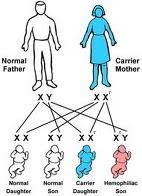Hemophilia is an inherited bleeding disorder in which, it takes a long time to clot.It is also known as the "Royal Disease"
History of Hemophilia !
Hemophilia has been around for many years. Although, they have recently found an effective treatment for it. It got its nickname the "royal disease" when members of a noble family were affected. To treat this scientist used snake venom, plasma from animals, and performed blood transfusions using fresh blood.
Oh no ! How will I know if I have this?
The symptoms of Hemophilia are abnormal bleeding, blood in urine, pain and/or swelling in muscles or joints, backache, headache, nausea, vomiting, and seizures.
What causes this?
Men only have one dominant allele. Women have two dominant alleles. If one X chromosomes carries the dominant gene, the recessive gene on the other X chromosome will protect the woman from hemophilia. The gene does not affect women, but they carry it and pass it on to their children.
For instance:If a woman is a carrier, there is 50% chance that her sons will have the disorder. There is also a 50% chance that her daughters will be carriers of the disorder. This is if the womens partner ist hemophiliac.
For instance: A man that has hemophilia has a 100% chance that his daughters will be carriers of it, since they inherit the dominant x chromosome from the father. Therefore, his sons will not be affected by it if the mother is not a carrier.
How is Hemophilia diagnosed ?
If you have heavy bleeding or bad bruising. Your doctor may take a look at your families history of heavy bleeding. They may give you blood test which are used to tell how long it takes your blood to clot,if your blood has low level of clotting factors, and if one of your clotting factors a missing from your blood. This will tell if you have Hemophilia, and which type you have.
| Mild hemophilia: | 5–30 percent of normal clotting factor |
| Moderate hemophilia: | 1–5 percent of normal clotting factor |
| Severe hemophilia: | Less than 1 percent of normal clotting factor |
How do I get rid of this ?
There really isn't a cure for Hemophilia. To keep from worsening the problem you should avoid aspirin, ibuprofen, or any other anti-inflammatory agents. Drink plenty of water and try replacement therapy. When you're bleeding externally, apply pressure to location of bleeding. When you're bleeding internal apply ice or put on a splint. You may also want to ask your doctor to prescribe you DDAVP (Octostim), Aminocaproic acid (Amicar) or tranexamic acid (Cyklokapron). If things get to bad you may have to receive an IV fusion.
How could you prevent this from happening to you?
There really isn't a way to prevent Hemophilia because it's an inherited disorder. To lower the risk of it though you should practice a healthy diet and encourage your family to do the same. People who have it should avoid situations that cause bleeding and have good dental habits.
What's being done ?
Many research is being done for Hemophilia. The past few decades they have been receiving an explode of successful results. Right now scientist are centering their research around gene therapy. This theraphy will work like this. Scientist will remove cells from a person with hemophilia, then change the cells genetically by putting new genetic material into them that reprograms the cells.
I Support Hemophilia !
National Hemophilia Foundation
The National Hemophilia Foundation is dedicated to finding better treatments and cures for bleeding and clotting disorders and to preventing the complications of these disorders through education, advocacy and research.
1.What is hemophilia?
2. Is hemophilia curable?
3. What's the nickname for this disorder?
4. What are some symptons of hemophilia?
5. How do doctors diagnose hemophilia?
The National Hemophilia Foundation is dedicated to finding better treatments and cures for bleeding and clotting disorders and to preventing the complications of these disorders through education, advocacy and research.
Quiz
1.What is hemophilia?
2. Is hemophilia curable?
3. What's the nickname for this disorder?
4. What are some symptons of hemophilia?
5. How do doctors diagnose hemophilia?
Sources Used To Make This Complete...
http://www.ncbi.nlm.nih.gov/pubmedhealth/PMH0001564/
http://www.emedicinehealth.com/hemophilia/article_em.htm
http://www.nhlbi.nih.gov/health/dci/Diseases/hemophilia/hemophilia_diagnosis.html
http://www.thirdage.com/hc/c/hemophilia-prevention
http://www.wfh.org/2/1/1_1_3_HistoryHemophilia.htm
http://www.hemophilia-information.com/Cure-for-hemophilia.html
2. No
3. Royal Disease
4. Abnormal bleeding, blood in urine, pain and/or swelling in muscles or joints, backache, headache, nausea, vomiting, and seizures
5. They give blood test
http://www.emedicinehealth.com/hemophilia/article_em.htm
http://www.nhlbi.nih.gov/health/dci/Diseases/hemophilia/hemophilia_diagnosis.html
http://www.thirdage.com/hc/c/hemophilia-prevention
http://www.wfh.org/2/1/1_1_3_HistoryHemophilia.htm
http://www.hemophilia-information.com/Cure-for-hemophilia.html
Answers
2. No
3. Royal Disease
4. Abnormal bleeding, blood in urine, pain and/or swelling in muscles or joints, backache, headache, nausea, vomiting, and seizures
5. They give blood test
Subscribe to:
Posts (Atom)



